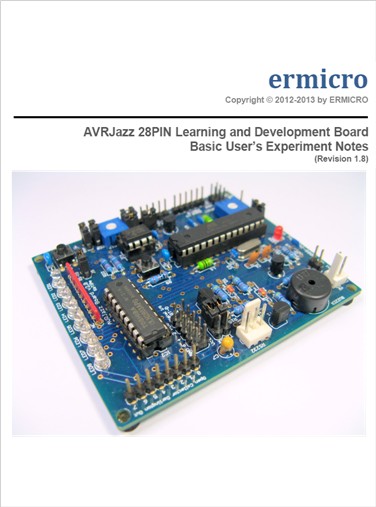Welcome to ermicroblog
Sunday December 22, 2024Are you looking for something fresh, update and simple explanation on the microcontrollers and electronics concept?
Here at ermicroblog we always bake fresh new projects,
tutorials, and ideas. Any sugestions and comments would be most welcome.
Have a pleasure reading and hope you enjoy visiting ermicroblog.
Feature Video
July 2017 Top 10 Pageviews
e-Book
Basic User’s Experiment Note

The “Basic User’s Experiment Note” is based on the popular 8-bit Atmel AVR ATmega328P microcontroller using AVRJazz 28PIN development board. This ebook covering most of the Atmel AVR ATmega328P microcontroller features and it’s aimed for the beginners, hobbyist, or anyone who wants to learn and understand the 8-bit Atmel AVR ATmega328P microcontroller powerful features. Read more »
Latest Entry
Working with AVR microcontroller Communication Port Project
Monday December 15, 2008 by rwb, under Microcontroller.
Back in the old days the COM port or known as RS-232 (EIA-232 standard) is one of the essential communications protocol and hardware use in many computer system installation start from small UNIX machine to the mainframe. Read more »
No Comments
Atmel AVR ISP Microcontroller Programmer Project
Monday December 08, 2008 by rwb, under Microcontroller.
One of the frustrating part in learning AVR microcontroller for the beginners is the AVR microcontroller programmer. The question is how to program my AVR mircrocontroller; actually if you googling on the internet and search for AVR ISP Programmer there are plenty information; start from simply using your PC parallel port to the sophisticated Atmel owned AVRISP mkII programmer. Read more »
2 Comments
Introduction to AVR Microcontroller Pulse Width Modulation (PWM)
Friday December 05, 2008 by rwb, under Microcontroller.
PWM is used in many industrial mostly for controlling the motor speed. The PWM is used because it’s the most efficient method comparing to the analog one. That’s why most of the modern microcontrollers today have this features build in. Read more »
No Comments
Beginners AVR Assembler Language Programming 3
Sunday November 30, 2008 by rwb, under Microcontroller.
At the college’s library Susan is busy to find a books related to the subsumption architecture for programming the smart machine. This is a new approach for machine artificial intelligent study, first introduced in 1986 seminar paper by Rodney A. Brooks, now head of the MIT AI Lab. While concentrate on searching these books, suddenly David appears at her site with his typical smile on his face; Hi Susan… (click here for previous tutorial) Read more »
1 Comment
Diode for reducing the voltage output
Wednesday November 26, 2008 by rwb, under Yet Another Tips.
When a silicon diode is in forward bias, the voltage drop across the PN junction is about 0.7 volt, therefore this behavior can be used for reducing the 4 x AA/AAA alkaline battery (it’s about 6 volt) to power your Microcontroller project. Read more »
No Comments
Beginners AVR Assembler Language Programming 2
Tuesday November 25, 2008 by rwb, under Microcontroller.
From her house’s window, she could see David holding his notebook walking across the street towards her house. She runs down the stair to open the door (click here for first tutorial)
David:
Hi… sorry for being late, I’ve had trouble downloaded the Atmel AVR Studio 4 and the ATtiny 2313 microcontroller datasheet as you asked me yesterday; You know it’s seem my internet provider always has a problem when I need it most. Read more »
3 Comments
Beginners AVR Assembler Language Programming 1
Friday November 21, 2008 by rwb, under Microcontroller.
I will present this tutorial using this following imaginary conversation between David and Susan; hope you enjoy
David:
Why should I learn coding in assembler language? It’s a machine language and for sure it’s very hard to learn!
Susan:
The truth is no one actually can really understand the machine language as it only contains “0” and “1”; or what we know as a binary, event the most experience programmer could not understand this kind of language. Read more »
No Comments
ermicroblog pages
Home | Login | Register | About
